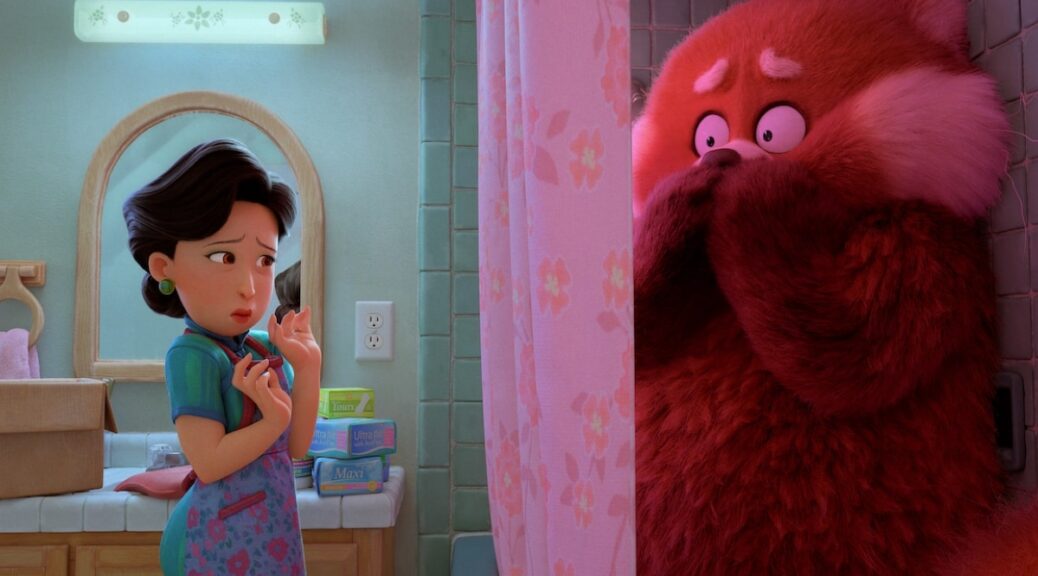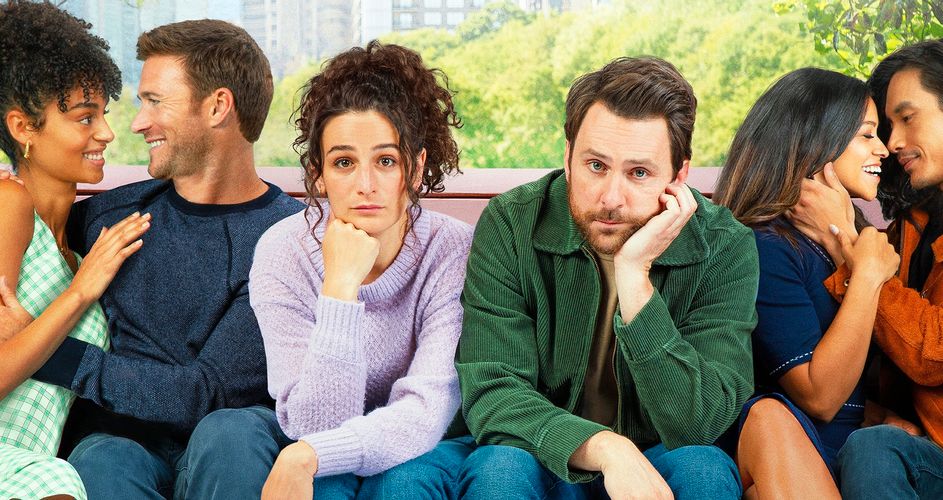Turning Red
by George Wolf
With baseball still on hold for this year, it’s safe to say the most impressive batting average out there still belongs to Pixar. Twenty-four films in, and seeing that name at the top of the poster still has me expecting excellence.
Turning Red – Pixar’s twenty-fifth – keeps the winning streak alive with a frisky, meaningful and culturally rich update of a well worn message.
Meilin Lee (voiced by the completely captivating Rosalie Chiang) is a 13 year-old honor student in Toronto circa 2002. She loves math, her besties (Miriam, Priya and Abby), and the 5 singers in “4-Town” (the boy band craze is the most likely reason for the early 2000’s time stamp).
But above all, Mei lives by one rule: honor your parents!
Yeah, um…that rule is going to get tested when 4-Town comes to Toronto just as Mei’s world turns completely upside down.
Mother Ming (Sandra Oh) has never disclosed the “quirk” in their family history, and now it’s staring back at Mei from the bathroom mirror. The mystical powers wielded by ancient ancestor Sun-Ye promised that one day Mei would awaken as a giant red panda. That day has come, and once Ming understands it’s not that other red visitor that has her daughter locking doors in panic, Mom explains.
Strong emotions will release Mei’s inner panda, so she must keep a calm demeanor until the family can gather and perform the ancient Chinese ritual that will banish that bear forever.
Stay calm? Now? The 4-Town show is coming up, and the girls have to score some tickets without helicopter Ming finding out! And there’s this bully at school that needs to be taught a lesson! Plus, that dreamy Devon at the Daisy Mart has Mei feeling some strange new feelings…
Sure, the panda is a cute metaphor for the raging hormones of puberty, but director Domee Shi (who also co-writes with Julia Cho) has much more to offer in her feature debut. Here, the often generic moral of “be true to yourself” plays out with stakes that will feel authentic to both kids and parents. Pixar has a long history of finding true poignancy amid big laughs, but Turning Red feels like a turning point.
Not only is it the first Pixar film with a female director, women are also in leadership roles throughout most areas of the production. The mission was clearly to begin speaking to a slightly older target, with a tender honesty that adolescents – girls especially – could appreciate.
Mei’s feelings of pressure and confusion are laughed with, not laughed at, and her first fantasies of physical romance are presented with a refreshing, relatable warmth.
There’s also fresh air blowing through the animation department, realizing Shi’s self-described “Asian ‘tween fever dream” with an aesthetic that yearns for the big screens the film is not getting. Mei’s world is alive with modern vibrancy, yet full of bursts that recall more classic animation styles, including hand-drawn and slo-motion sequences, as well as eyes and mouths that suddenly pop open wide with anime homages.
Effervescent pop songs by Billie Eilish and Finneas O’Connell (who also voices 4-Town’s Jesse) blend joyously alongside Ludwig Göransson’s more traditional score, completing the film’s perfect ecosystem of subtext.
Respect the past, but embrace the possibilities of the future. That future is going to include parts of your true self that are messy, and that’s okay. In fact, accepting those awkward, messy parts is the first step to being okay.
Really, the most disappointing thing about this film is that it’s going straight to Disney+. A theater experience might make the promise of mother-daughter bonding feel even more memorable, if not downright eventful (as the trips to see the first Toy Story were for my son and me).
But Turning Red finds Pixar with a healthy and welcome new approach to its lineup. So wherever it’s found, that’s more than okay.












